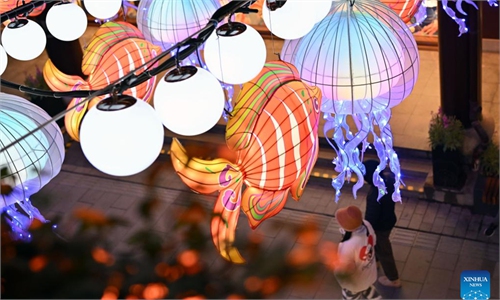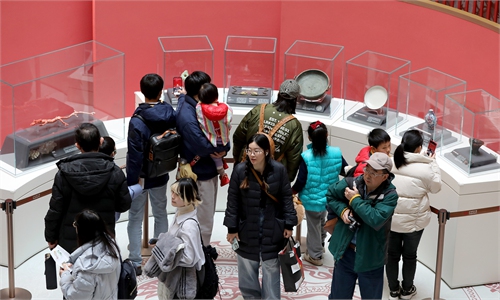ARTS / CULTURE & LEISURE
Hit TV series sparks Shanghai dialect craze, artistic performance boom
Rediscovered and revitalized

A painting of the landmark buildings in Shanghai Photo: VCG
Blossoms Shanghai, a TV drama that depicts a story set in 1990s Shanghai, has become a hit TV series attracting much attention and sparking many discussions.
Directed by renowned Shanghai-born Hong Kong director Wong Kar-wai, the drama was released in both Putonghua and Shanghai dialect. The dialect version has become an unexpected viral sensation, and has even set off a Shanghai dialect-learning craze.
Dialects contain the culture of a geographical location and the emotional connection of the people who inhabit it. Regrettably, in Shanghai, an international, immigrant city boasting a population of 24 million, the Shanghai dialect is far less popular than Putonghua, and sometimes even less preferred to English.
"Now I'm so glad to see Blossoms Shanghai brings about the Shanghai dialect craze," Huju opera artist Chen Suping told the Global Times. Huju opera is a form of traditional Chinese opera from the Shanghai area, typically sung in the Shanghai dialect.
What makes Chen even happier is that the craze has injected much-needed vitality into Shanghai-dialect artistic works and performances, as more and more people are willing to enjoy the various artistic expressions of the Shanghai dialect in theaters or on social media.
Chen is one of a growing number of Shanghai dialect literary enthusiasts and art professionals who are committed to the inheritance and promotion of the dialect, especially among young people.
The Global Times recently spoke with some from this key demographic, who shared their deep affection for and their efforts in popularizing the Shanghai dialect.
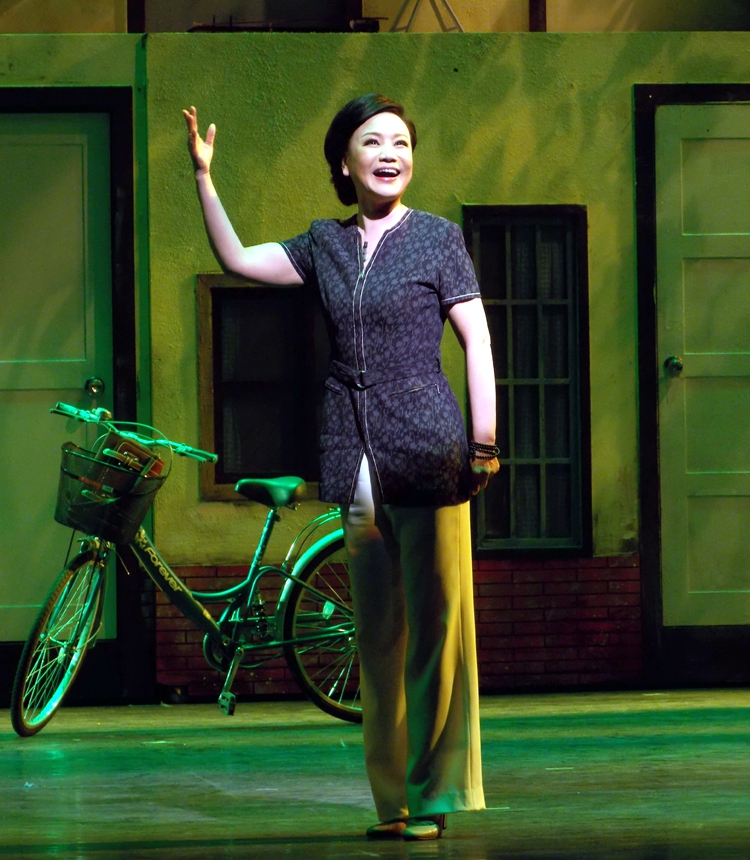
Chen Suping Photo: Courtesy of Chen Suping
Adapted from the novel Fanhua, or Blossoms, the drama tells the story of a man striking it rich by punting on the earliest stocks listed on the Shanghai Stock Exchange, introducing audiences to a vibrant Shanghai during the wave of economic reforms in the 1990s.
Blossoms Shanghai is so popular in Shanghai these days that "I don't know anyone around who hasn't watched it," joked Chen.
Chen, who has been engaged in Huju opera for 46 years, is now a representative inheritor of the national intangible cultural heritage of Huju opera and serves as the head of the Shanghai-based Changning Huju Opera Troupe.
Chen praised the dialect version of Blossoms Shanghai for fully capturing the temperaments and charms of the Shanghai dialect - "gentle, elegant and fashionable," Chen told the Global Times.
The Huanghe Road in downtown Shanghai recently became a popular tourist destination, after audiences discovered that many scenes in the series had been shot along the road.
The scenes were very familiar to Hua Luoyun, a 33-year-old reading vlogger who grew up in a community on Huanghe Road.
"I lived there for 23 years, I spent a very happy time there," Hua recalled.
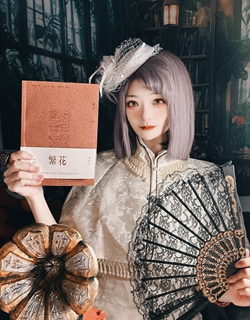
Hua Luoyun Photo: Courtesy of Hua Luoyun
In her vlog, Hua shared the highlights of the book, and her understanding of the connotation of the Shanghai dialect, that is, it "embodies Shanghai's city spirit of being tolerant to diversity," Hua said flawlessly in the Shanghai dialect.
On Chinese social media, many users commented on the video, praising Hua's effort in sharing the beauty of the Shanghai dialect.
"I'm a Shanghai native working thousands of kilometers away," a user wrote. "Blossoms Shanghai and your vlog make me feel very close [to home]. The dialect is a way home."
Protect before it's late
Meanwhile, it is a pity that the Shanghai dialect has gradually faded over the past decades due in part to the in surge immigration and the promotion of Putonghua and English among younger generations.
Hua recalled that when she was a child, her generation was asked to speak Putonghua at school. And now, few of her native peers opt to speak in the Shanghai dialect.
"One of my friends was proud of her 2-year-old English-speaking daughter, but this native Shanghai baby can't even understand the Shanghai dialect," Hua said. "I feel sad about that."
Back in 2012, a survey by the Shanghai Academy of Social Sciences showed that only 60 percent of Shanghai native middle school students could "fully understand and basically speak the Shanghai dialect."
The situation hasn't improved much since the survey was released, especially in the last two to three years, according to some Shanghai-based sociologists and linguists.
That makes Chen anxious.
"Many children can't speak the authentic Shanghai dialect, and some don't even speak the language at all," she told the Global Times.
Chen was determined to do something. In 2015, Chen, who at the time also served as a city legislator, tabled a motion at the Shanghai Municipal People's Congress to better protect and promote the dialect.
"There is no time to lose in saving the Shanghai dialect," she told the media that year.
Personally, Chen has put her passion for popularizing the Shanghai dialect and Huju opera into practice.
She has set up the non-profit "Huju opera inheritance bases" at two secondary schools in Shanghai, where she teaches students Huju opera and Shanghai dialect-related culture along with other teachers.
Through Chen's effort, many students have fallen in love with the Shanghai dialect and Huju opera.
"Each inheritance base only had some 20 students at the beginning," said Chen. "Now the number has increased to nearly 80."
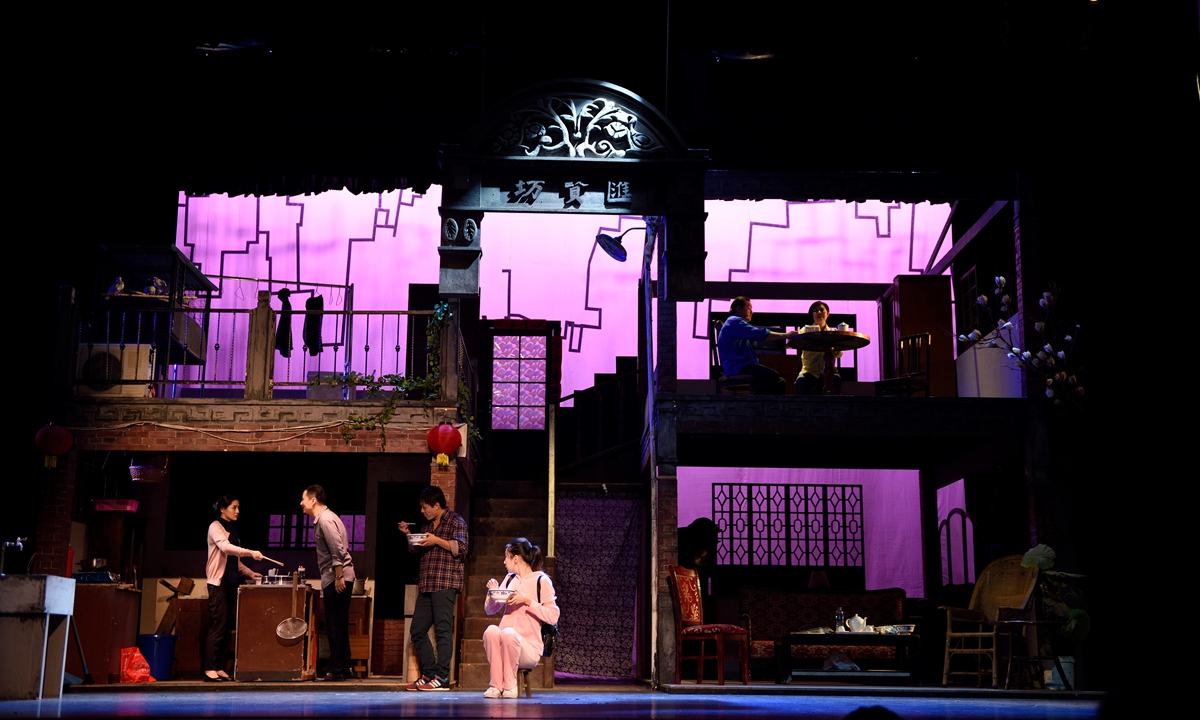
A scene from Shanghai-dialect play Hui Xian Fang Photo: Courtesy of Shanghai Modern Theatre
More forms
What is even more gratifying to Chen is that in recent years, more and more forms of Shanghai-dialect literary and artistic works and performances have emerged to cater to various public tastes, especially among young people.
Apart from Huju opera and antimasque, now there are new forms such as Shanghai-dialect stage plays, stand-up comedy and comedy skits, the Global Times found.
The Shanghai Modern Theatre, for instance, has staged some six Shanghai dialect plays featuring different themes. Some of the themes focus on urban men and women in their 20s, able to resonate well with younger audiences, according to the theater.
In 2022, during the COVID-19 pandemic, the theater uploaded videos of its Shanghai-dialect play Hui Xian Fang online, and invited playgoers to watch it at home for free. It tells an interesting story of some Shanghai residents moving house from the more classic Shikumen lane houses.
The play received very warm responses when it debuted in downtown Shanghai in 2017, said Zhang Yu, director of the theater.
"The play's language allows the local audience members to feel an intimate connection to the plot," he told the Global Times.
The growing popularity of Blossoms Shanghai is a good start for the promotion of the Shanghai dialect, said Chen.
Hua hopes that this dialect craze will continue, and more people will get to know and love the Shanghai dialect. "It is not only a language, but the root and soul of Shanghai and its people," she said.

